Hashish is a manufactured from the hashish sativa plant, and comprises many cannabinoids that engage with the endocannabinoid machine. Delta-9-tetrahydrocannabinol (THC) and cannabidiol (CBD) are two of probably the most well-studied cannabinoids. THC is psychotropic, and able to generating a “prime,” whilst CBD is non-psychotropic and does now not exert this impact.

Biosynthesis of THC vs CBD
Cannabigerolic acid (CBGA) is the precursor to each THC and CBD. Cannabidiolic synthase (CBDA synthase) and tetrahydrocannabinolic acid synthase (THCA synthase) catalyze the oxidative cyclization of CBGA into CBDA and THCA, respectively. CBD and THC are produced through next decarboxylation of those acidic bureaucracy.

The mechanism of motion of THC vs CBD
THC exerts its results by way of interplay with the CB1R (endocannabinoid sort 1 receptor) and CB2R (endocannabinoid sort 2 receptor). CB1Rs are considerable within the mind, situated in areas related to cognition, reminiscence, praise, and ache belief, amongst others, and CB2R are most commonly discovered within the outer edge, on immune cells, lymphoid tissue, and peripheral nerve terminals.
CB1R and CB2R engage with endogenous ligands together with anandamides, which might be arachidonic acid derivatives. The endogenous machine modulates neuronal job by way of cyclic-AMP, Ca2+ shipping, and Okay+ ions, and is considered related to opioid, GABAergic, dopaminergic, and a number of other different methods. THC exerts its psychotropic results by way of CB1R binding and downstream signaling.
Then again, CBD does now not bind and stimulate the CB1 receptor, and due to this fact does now not exert psychotropic results. Contemporary proof suggests CBD is a detrimental allosteric modulator of CB1R, fighting THC binding and stimulation. It has additionally been recommended that CBD would possibly engage with the endocannabinoid machine by way of oblique mechanisms together with: inhibition of adenosine uptake, enhanced 5-HT1A receptor job, enhanced job at glycine receptor subtypes, amongst others.

THC for scientific prerequisites
There’s vital anecdotal proof supporting using hashish for quite a lot of scientific prerequisites, alternatively, there may be restricted literature to toughen those claims. Many research are underway to inspect the protection and efficacy of hashish for the medication of more than a few scientific prerequisites together with:
- Irritation
- Ache
- Seizure
- Psychological issues together with melancholy and anxiousness
- Dermatologic prerequisites
- Most cancers ache control
- Neurodegenerative issues together with: Alzheimer’s illness, Huntington’s illness, Parkinson’s illness
- Migraine
Randomized managed trials investigating THC
RCTs investigating the consequences of hashish are restricted, due partly to the legality of its use. On the other hand, there were some randomized managed trials analyzing the efficacy of smoked hashish for more than a few scientific prerequisites:
- Hashish has been proven to alleviate power neuropathic ache amongst sufferers with HIV-associated sensory neuropathy.
- Hashish has been proven to be awesome to placebo for relieve of treatment-resistant spasticity amongst sufferers with more than one sclerosis.
- Hashish has been proven to decrease intraocular drive in sufferers with heterogenous glaucoma.
- Hashish has been proven to ameliorate neuropathic ache.
THC dangers and unwanted effects
There are some dangers and unwanted effects related to each temporary and long-term hashish use. Quick-term results come with impaired temporary reminiscence, motor coordination (impairing riding skill), altered judgement, and when ate up in prime doses, paranoia and psychosis. Lengthy-term or heavy use is related to altered mind building particularly amongst the ones eating hashish in early life. It might also building up the chance of growing power psychosis issues similar to schizophrenia amongst predisposed people.
There also are some conceivable unwanted effects related to scientific hashish use:
- Nervousness
- Dizziness
- Drowsiness
- Nausea and vomiting (occasionally critical)
- Lung infections (if smoked)
- Dry mouth
CBD for scientific prerequisites
As CBD does now not produce a prime, and does now not related to abuse or dependence doable, it’s an interesting possibility for managing many scientific prerequisites. Epidiolex, is a CBD oral answer that has been authorized through the U.S. Meals and Drug Management (FDA) for the medication of seizures related to uncommon and critical varieties of epilepsy (Lennox-Gastaut syndrome and Dravet syndrome) in babies. There also are many medical trials underway to evaluate the consequences of CBD for more than a few scientific prerequisites, together with:
- CBD for decreasing tremor amongst sufferers with Parkinson’s illness.
- CBD for decreasing illness job amongst sufferers with inflammatory bowel illness (IBD).
- Impact of CBD as a medication intervention for opioid relapse
- Impact of CBD on responses to emotional stimuli (to inspect the possible impact of CBD as an anxiety-reducing drug)
Randomized managed trials investigating CBD
A number of RCTs investigating the consequences of CBD had been finished, together with:
- CBD for acute schizophrenia
- CBD for generalized anxiousness dysfunction
- CBD for seizures in tuberous sclerosis complicated
CBD dangers and unwanted effects
The FDA does now not recently control the protection or purity of CBD offered as a nutritional complement, and it is going to comprise different unknown components. The healing dose of CBD for particular scientific prerequisites has additionally now not been established. Some commonplace unwanted effects related to CBD intake come with:
- Nausea
- Fatigue
- Irritability
- CBD might also carry the focus of sure medicines by way of a identical mechanism to grapefruit juice













